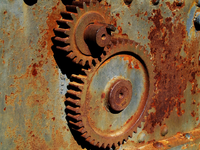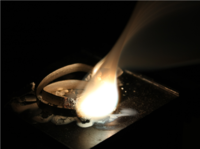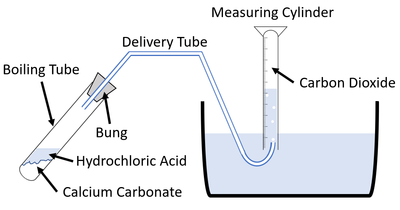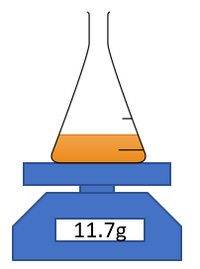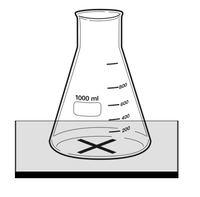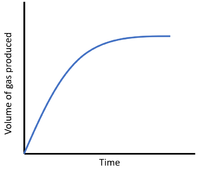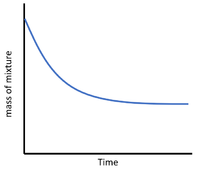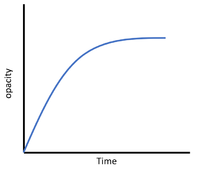Difference between revisions of "Rate of Reaction"
| Line 61: | Line 61: | ||
| style="height:20px; width:200px; text-align:center;" |The steep negative [[gradient]] shows a high '''rate of reaction''' as the [[precipitate]] is formed more quickly at the start of the [[Chemical Reaction|reaction]]. | | style="height:20px; width:200px; text-align:center;" |The steep negative [[gradient]] shows a high '''rate of reaction''' as the [[precipitate]] is formed more quickly at the start of the [[Chemical Reaction|reaction]]. | ||
|} | |} | ||
| + | |||
| + | ===Factors Affecting the Rate of Reaction=== | ||
| + | There are several factors which affect the '''rate of reaction'''. These include: | ||
| + | *[[Temperature]] - The higher the [[temperature]] the faster the [[Chemical Reaction]]. [[Exothermic]] [[Chemical Reaction|reactions]] may speed up as the [[Reaction Mixture|reaction mixture]] becomes hotter. | ||
| + | *[[Concentration]] - The higher the [[concentration]] of [[reactant]]s the faster the [[Chemical Reaction]]. As [[reactant]]s are used they become less [[concentration|concentrated]] and the [[Chemical Reaction|reactions]] tend to slow down as it progresses. | ||
| + | *[[Pressure]] - The higher the [[pressure]] of [[gas]]eous [[reactant]]s the faster the [[Chemical Reaction]]. | ||
| + | *[[Surface Area]] - The larger the [[Surface Area|surface area]] of a [[solid]] [[reactant]] the faster the [[Chemical Reaction]] as there is a greater [[area]] over which the different [[reactant]]s can interact. | ||
| + | *[[Catalyst]]s - [[Catalyst]]s can increase the '''rate of reaction''' by providing different reaction pathways. | ||
| + | |||
| + | The effects of [[temperature]], [[concentration]], [[pressure]] and [[Surface Area|surface area]] on '''rates of reaction''' can be explained by '[[Collision Theory]]'. | ||
Revision as of 12:48, 16 January 2019
Contents
Key Stage 4
Meaning
Rate of reaction is a measure of how quickly the reactants react to create the products.
About the Rate of Reaction
- The longer the time taken for a reaction the lower the rate of reaction. The shorter the time taken for a reaction the higher the rate of reaction.
- High rates of reaction are important to in industries where a lot of products are needed in a short amount of time. This can save money.
- Low rates of reaction are important in materials that corrode with chemicals in the environment. This allows them to last a long time before destroyed by Oxidation or chemical weathering.
Examples
| Rusting has a low rate of reaction. | Burning Magnesium ribbon has a high rate of reaction. |
Determining the Rate of Reaction
There are two approaches to finding the rate of reaction for some chemicals.
Continuously Measuring Volume of Gas
For reactions which give off a gas the volume of gas produced can be measured throughout an experiment to find the rate of reaction.
| This diagram shows a possible setup for measuring the gas given off during an experiment. |
Continuously Measuring the Mass
For reactions which give off a gas the mass of reaction mixture can be measured throughout an experiment to find the rate of reaction.
| This diagram shows a possible setup for measuring the mass of the reaction mixture during an experiment. |
Continuously Measuring the Opacity
For reactions in which the reactants are in a transparent solution but the products form an insoluble precipitate that is opaque then the opacity can be measured.
| This diagram shows a possible setup for identifying when a mixture becomes opaque during a reaction by drawing a black cross on a white tile and observing until the cross can no longer be seen. |
Rate of Reaction from Graphs
On a graph with time on the x-axis and the amount of reactant or product on the y-axis the rate of reaction can be seen from the gradient.
| The steep positive gradient shows a high rate of reaction as the gas is produced more quickly at the start of the reaction. | The steep negative gradient shows a high rate of reaction as the gas is being lost more quickly at the start of the reaction. | The steep negative gradient shows a high rate of reaction as the precipitate is formed more quickly at the start of the reaction. |
Factors Affecting the Rate of Reaction
There are several factors which affect the rate of reaction. These include:
- Temperature - The higher the temperature the faster the Chemical Reaction. Exothermic reactions may speed up as the reaction mixture becomes hotter.
- Concentration - The higher the concentration of reactants the faster the Chemical Reaction. As reactants are used they become less concentrated and the reactions tend to slow down as it progresses.
- Pressure - The higher the pressure of gaseous reactants the faster the Chemical Reaction.
- Surface Area - The larger the surface area of a solid reactant the faster the Chemical Reaction as there is a greater area over which the different reactants can interact.
- Catalysts - Catalysts can increase the rate of reaction by providing different reaction pathways.
The effects of temperature, concentration, pressure and surface area on rates of reaction can be explained by 'Collision Theory'.
